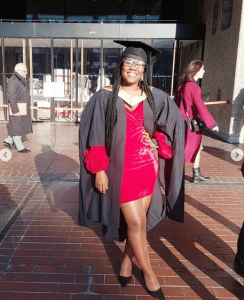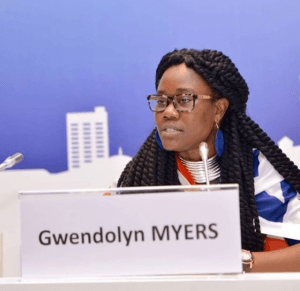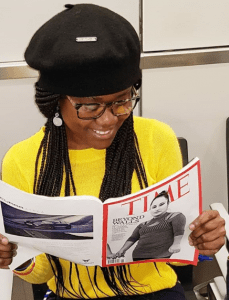 Gwendolyn Myers (International Politics and Human Rights, 2019) has been in the pursuit of global peace for over a decade. Her non-profit organisation Messengers of Peace Liberia has enabled her to spread her message of unity globally. Gwendolyn has spoken in front of the UN, advocating young people in peace and the importance of international co-work to establish universal peace.
Gwendolyn Myers (International Politics and Human Rights, 2019) has been in the pursuit of global peace for over a decade. Her non-profit organisation Messengers of Peace Liberia has enabled her to spread her message of unity globally. Gwendolyn has spoken in front of the UN, advocating young people in peace and the importance of international co-work to establish universal peace.
Gwendolyn came to City in pursuit of understanding the political implications of peacebuilding – she found the course immensely useful, starting to implement the things she learned in her organisation well before graduating. In 2019 Gwendolyn was recognised as the TIME Magazine Top Eight Young Reformers Across the Globe Shaping the World, this amazing recognition has given her name as well as her organisation a boost to be noticed more on the global peace business landscape. City, University of London is proud to be able to further educate and play a role in the activities of young leaders and reformers from around the world who come to learn more about how they can make a difference in their local communities.
Read more about Gwendolyn and her inspiring journey to becoming one of the top global reformers of peace.
Can you tell us a bit about your educational background and what led you to studying at City.
I come from a country in West-Africa, Liberia. My undergraduate degree was in biology and chemistry, the decision to transition from Medicine to Social Sciences I think was made to inspire to lead and to serve.
As a young person you, of course, follow the advice and guidance of your elders and your parents, but it is also very important to listen to the passion and calling inside you. I have said this before and think it is necessary to repeat that young people should respectfully decline, important emphasis on respect, recommendation and expectations you receive – you need to be able to say ‘hey, this is about my journey’. I take into consideration cultures and traditions where it’s common to expect things from young people. You can’t talk about peace and leave out the culture of peace.
I got an undergraduate degree in Liberia from The Mother Patern College of Health Sciences, Stella Maris University – BSc in Biology and Chemistry. After I received my undergraduate degree, I received a scholarship through the Gbowee Peace Foundation Africa, which enabled me to go to the US. In the states I learned about Peacebuilding and Leadership in the Eastern Mennonites University from 2011 – 2014, the course was very intensive but it taught me a lot about the path where I was leading my career. After I had finished my studies there, I went to the Institute of Global Engagement in Washington DC to do another two years Postgraduate Fellowship with The Center for Women, Faith and Leadership Programme (CWFL) in Religion and Peace Building followed by a Capstone Project on “Youth Against Violent Extremism-Involving Young People in Peacebuilding, Violence Reduction and Conflict Resolution Programmes in Liberia: Implementation lessons for establishing an Institute of Peace Dialogue (IPD)”.
After studying in Washington I did a six-month intensive Dialogue and Mediation training to be certified as a young mediator with The Folke Bernadotte Academy (FBA), Swedish Agency for Peace, Security and Development – for this, I went to Sweden, Cambodia and Nepal so that I could get experience and see hands-on community mediation.
Finishing the mediation training I was able to apply for a Chevening Scholarship, a program that identifies potential leaders that are trained in the UK to develop their leadership skills which they can then utilise in their home countries. I was selected to join the programme and was able to come over to the UK. I chose joining City as the University because I believed I would be able to push and develop my abilities far beyond what they were before.
My focus has always been on youth involvement, peace and security. It is one thing to advocate all of that but another to actually understand the politics behind it, which is what City helped me a lot with.

With the Chevening Scholarship you could choose what to study. How come you chose Politics and Human Rights instead of Peace Studies and how has what you’ve learned affected your non-profit: Messengers of Peace Liberia Inc (MOP)?
Well, the scholarship gave me an opportunity to learn anything I wanted as they paid for all the expenses. Everyone around me thought I would do Peace Studies. This time around, however, I decided to do something a little different from “peace”. When discussing global peace, which I’m very passionate about, it has political implications – you can’t talk about sustainable peace from a global perspective and not understanding what political implications may be hindering it.
That’s the main reason I found my time in City very interesting. I started applying the things I learned before I even finished my studies. As part of strategic diplomacy and decision-making, I got the chance to meet the foreign minister in Liberia, giving me an opportunity to discuss foreign policy and global agenda to create peace.
The discussions on human rights issues, specifically regarding migration and open borders, is something that grew to become of great interest to me during my time in City. I really enjoyed how the seminars on this topic were built and I liked the model of teaching that was being used – I was able to engage a lot with my peers, as well as the academics.
I am definitely trying to advocate the mindset of thinking globally and acting locally which was also a big part of the seminars at City. Our actions must create tangible impact on a local level. It means nothing to talk about human rights if it doesn’t have an impact on an ordinary village boy or girl. I can see clearly from my non-profit that this mindset has an effect on the local communities. When I went back home from the UK, I immediately took what I had learned from the University and applied it to my region, the Mano River Union. I started from Sierra Leone – mobilising the young people there to start a conversation around social cohesion. That is something we feel we need to understand fully and implement entirely to then start growing onto a national and then global scale.
Can you tell us more about your non-profit organisation, what you’ve achieved so far and what you hope to go on to do?
We have been in operation for 11 years having created the organisation in 2008. We started off with only a handful of young people and now we have over 1,500.The young volunteers are called Young Volunteer Peace Messengers, together we do community engagement, we also train young people to do community mediation. Young people were seen during the presidential election in polling stations and institutions to do conflict resolutions. They were demonstrating and were part of vigilante groups to ensure that their communities are safe during the Ebola crisis.
I spend all of my time, when I am in Liberia, engaging with local communities or striving to make a difference. We teach our peace messengers how to mentor young people so that our message of peace gets carried on through them.
From 2008 to now we have been seen to play a very active role when it comes to peace and security. I grew up in post-war Liberian country. I know what it feels like to run from bullets and not feel safe. I’ve seen kids get given guns and be child soldiers to inflict destruction. While studying medicine I had a feeling that what is happening isn’t right, that I need to do something. That’s when I started my organisation. I knew, that if young people can be used for violence, they could also be used for peace.
Personally, I have been privileged enough to be recognised through a lot of different mediums. In 2019, I was recognised as the TIME Magazine Top Eight Young Reformers Across the Globe Shaping the World. In 2015, the United Network of Young Peacebuilders (UNOY) asked me as a young person to deliver a speech on advocating for Security Council resolution: youth, peace and security – this was the first-ever official address to the United Nations Peace Building Commission in New York. After my speech was finished, I expected questions from member states but only got a “thank you”. They told me that my speech brought life to the UN.
My address to the UN was what began the ascent of my message onto the global scale.
One of the main massive accomplishments for my organisation, was that the first-ever National Peace Prize from the government of Liberia was awarded to our organisation Messengers of Peace in August of 2018. This happened just before I was about to come to the UK to study at City, University of London. Following the award from the President of Liberia, my thank you note to the people and president of Liberia, was that peace, has been rebranded with young people.
It’s easy to talk about these achievements now, but it’s not magic. I had times I cried. Being a young woman and an executive in a male-dominated society, is not an easy thing. People see the success outside and think it’s easy, but it’s not.
At some point in the future, I will transition over to Women, Peace and Security Agenda, as I won’t really be a young person anymore. In one of my lectures at City we discussed how difficult it is to let go of something you founded. Regardless, what I eventually want for my organisation is to mentor and develop young people to be leaders to then take over Messengers of Peace Liberia Inc. I have seen some of the kids I mentored already prove their leadership when I’ve been gone for longer periods of time. It gave me confidence that when I leave this foundation behind, my dream will be continued.
What are the biggest challenges you have encountered in your work?
Funding is a huge challenge. The work I do is not sexy. Violence is sexy peace is not. When you try to hype up something bad it’s more interesting to see but peace is not attractive, what we are trying to do is make peace look more interesting and attractive, make it sexy. I am investing my own money into it and don’t make any sort of salary from it – at times it can be quite tough.
My movement is led by a hashtag #byfaithsheleads – what is behind my strong resolve, is my faith. Whatever religion you come from you need to reconnect with yourself and understand your true calling. That is something I managed to achieve, Messengers of Peace is not something to just do, I’m here to serve and here to lead.

Since you’ve finished studying and right up until this point of nearly graduating, what have you been up to and what is next for you?
I am currently in the planning stages of appearing in a documentary called “Frontline Women” to be filmed for a documentary revolved around ‘Top Seven Women Breaking Barriers for Peace Building in Africa’. In addition, I have recently been appointed as the youngest ever serving board member for Mediators Beyond Borders International (MBBI) based in the US. My tenure for this will be three years.
During the same period I lost my father, City, University of London announced my selection as the overall winner of the President’s Awards, to become this year’s addition to City’s gallery of Extraordinary Women achieving the extraordinary since 1894. My addition to City, University of London gallery of Extraordinary Women in commemoration of International Women’s Day 2020 is an acclamation of what is to come, and exactly what my father desired as an educator.
Furthermore, I am presently serving as Co-Chair for the Liberia National Youth Taskforce Against COVID-19, under the auspices of the Ministry of Youth and Sports, Republic of Liberia. The task force, which is a consortium of youth-led organizations, is leading community-based actions against COVID-19. Raising awareness and distributing sanitary materials.
For me this is about the service though, all these titles don’t get into my head. I am still recovering from a few of them, but just need to get used to it. I don’t have time to be emotional about it. It’s all for the glorification of God’s Kingdom.
Do you have any advice for others looking to make a difference, particularly in the world of peace?
Leave no one behind! We must be inclusive, love each other. I don’t think we can achieve peace without meaningfully involving both the youth and women. Not just to have them in the room to show that we include people but actually have their voices be heard and allow them to make a difference.
Also, we must reach out to relate to the people around us. We must connect with ordinary people. We must care, and show interest.
I am very hopeful that one day World peace is possible. Whether it is in our time or if it’s for people after us, we are building the foundation for it. We are inspiring and urging people to continue the mission for peace after us.
You can follow Gwendolyn’s activities further on her Instagram page!